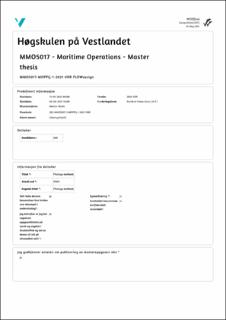| dc.contributor.author | Hovda, Knut | |
| dc.date.accessioned | 2021-08-02T09:20:11Z | |
| dc.date.available | 2021-08-02T09:20:11Z | |
| dc.date.issued | 2021 | |
| dc.identifier.uri | https://hdl.handle.net/11250/2765799 | |
| dc.description | Maritime Operations,
Western Norway University of Applied Sciences | en_US |
| dc.description.abstract | Since the first regulations on pilotage there have been an evolution in shipping. New pilotage methods have been to obtain the regulations on pilotage. The classic pilotage method is seen as the original method, whilst pilot exemption certificates have been implemented in many nations and other methods such as remote pilotage is not widespread yet.
This research aims to investigate primary users` in the pilot service perception on the three pilotage methods. The informants that are involved in the research are navigators and pilots. A qualitative method consisting of open-format interviews, with an ISO-standard on quality in use, was used as a framework for the interview-guide.
The findings of the research are that the perception of the primary users for the three methods is as follows. The perception of classic pilotage has overweight in positive factors, the perception of PEC also has overweight in positive factors, while the perception of remote pilotage has overweight in negative factors | en_US |
| dc.language.iso | eng | en_US |
| dc.publisher | Høgskolen på Vestlandet | en_US |
| dc.rights | Navngivelse 4.0 Internasjonal | * |
| dc.rights.uri | http://creativecommons.org/licenses/by/4.0/deed.no | * |
| dc.title | Pilotage methods | en_US |
| dc.type | Master thesis | en_US |
| dc.description.localcode | MMO5017 | en_US |

